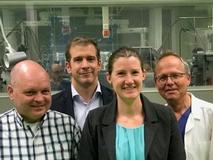Dräger acquires majority shares of STIMIT to further develop a new therapy for non-invasive stimulation of respiratory muscles
06.04.2021
Drägerwerk AG & Co. KGaA has acquired the majority share of STIMIT AG, a Swiss medtech startup founded in 2018. With this acquisition, Dräger further expands its expertise in the field of lung-protective ventilation. STIMIT is specialized in lung activation and non-invasive stimulation of respiratory muscles in intensive care patients.
 |
Different courses of disease may require artificial respiration. The novel coronavirus is just one of them. If the body is no longer able to breathe on its own to a sufficient extent, mechanical ventilation can save lives. However, after just a few days of ventilation, there is a risk of weakening the respiratory muscles and diaphragm. In order for patients to be able to breathe on their own again, the diaphragm, as the most important respiratory muscle, must be maintained and built up. STIMIT plans to achieve this by means of electromagnetic fields that stimulate the diaphragm.
 “With Dräger at our side, we will create clinical evidence to establish a novel therapy to serve patients,” says Ronja Müller-Bruhn, founder and CEO of the STIMIT AG. “Dräger’s investment in STIMIT combines the innovation and pace of a startup with the expertise, technology wealth, and entrepreneurial spirit of the leading premium provider in respiratory care,” says Dr. Georg Matheis, director of the STIMIT AG. “The STIMIT team is excited to work with Dräger to develop products for a new therapy to improve critical care.”
“With Dräger at our side, we will create clinical evidence to establish a novel therapy to serve patients,” says Ronja Müller-Bruhn, founder and CEO of the STIMIT AG. “Dräger’s investment in STIMIT combines the innovation and pace of a startup with the expertise, technology wealth, and entrepreneurial spirit of the leading premium provider in respiratory care,” says Dr. Georg Matheis, director of the STIMIT AG. “The STIMIT team is excited to work with Dräger to develop products for a new therapy to improve critical care.”
“STIMIT is working on a solution that is not yet available on the market. By acquiring a majority stake, we secure a head start in the development of noninvasive stimulation of respiratory muscles,” says Stephan Kruse, Head of Business Unit Therapy at Dräger. “As an expert in ventilation technology, it is of extraordinary interest to us to make ventilation as gentle as possible and to drive forward innovative solutions in this field.”
STIMIT will work together with Dräger in the following months to further develop the product and conduct clinical trials.
The Swiss-based startup STIMIT was founded in 2018 and works on solutions to strengthen the respiratory muscles of artificially ventilated intensive care patients, in a non-invasive way. STIMIT won Venture Kick in 2020 and participated in Venture Leaders Life Sciences the same year. Among other things, it aims to positively influence the weaning process from ventilation. Currently, the duration of the weaning process from artificial ventilation in ICU patients is approximately between 40 and 50 percent of the total ventilation time.1 The weaning process usually becomes more difficult as the duration of ventilation increases. In the long term, electromagnetic stimulation of the diaphragm should help shorten the period of ventilation and thus the time of hospitalization, as well as reduce the risk of complications.
Source: Dräger's Press Release 01.04.2021
 “With Dräger at our side, we will create clinical evidence to establish a novel therapy to serve patients,” says Ronja Müller-Bruhn, founder and CEO of the STIMIT AG. “Dräger’s investment in STIMIT combines the innovation and pace of a startup with the expertise, technology wealth, and entrepreneurial spirit of the leading premium provider in respiratory care,” says Dr. Georg Matheis, director of the STIMIT AG. “The STIMIT team is excited to work with Dräger to develop products for a new therapy to improve critical care.”
“With Dräger at our side, we will create clinical evidence to establish a novel therapy to serve patients,” says Ronja Müller-Bruhn, founder and CEO of the STIMIT AG. “Dräger’s investment in STIMIT combines the innovation and pace of a startup with the expertise, technology wealth, and entrepreneurial spirit of the leading premium provider in respiratory care,” says Dr. Georg Matheis, director of the STIMIT AG. “The STIMIT team is excited to work with Dräger to develop products for a new therapy to improve critical care.”“STIMIT is working on a solution that is not yet available on the market. By acquiring a majority stake, we secure a head start in the development of noninvasive stimulation of respiratory muscles,” says Stephan Kruse, Head of Business Unit Therapy at Dräger. “As an expert in ventilation technology, it is of extraordinary interest to us to make ventilation as gentle as possible and to drive forward innovative solutions in this field.”
STIMIT will work together with Dräger in the following months to further develop the product and conduct clinical trials.
The Swiss-based startup STIMIT was founded in 2018 and works on solutions to strengthen the respiratory muscles of artificially ventilated intensive care patients, in a non-invasive way. STIMIT won Venture Kick in 2020 and participated in Venture Leaders Life Sciences the same year. Among other things, it aims to positively influence the weaning process from ventilation. Currently, the duration of the weaning process from artificial ventilation in ICU patients is approximately between 40 and 50 percent of the total ventilation time.1 The weaning process usually becomes more difficult as the duration of ventilation increases. In the long term, electromagnetic stimulation of the diaphragm should help shorten the period of ventilation and thus the time of hospitalization, as well as reduce the risk of complications.
Source: Dräger's Press Release 01.04.2021
[]


